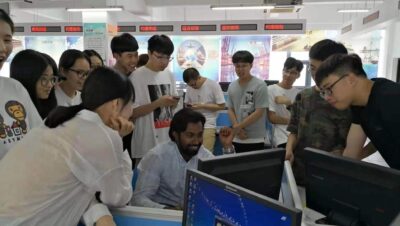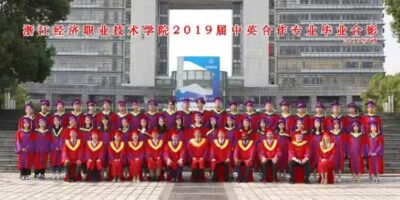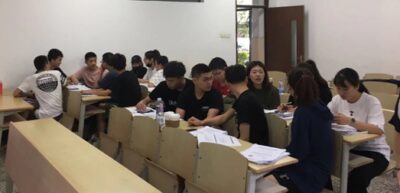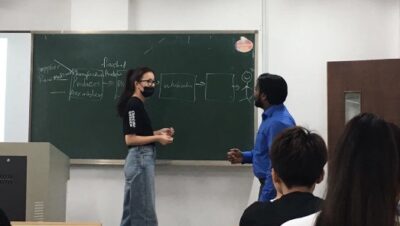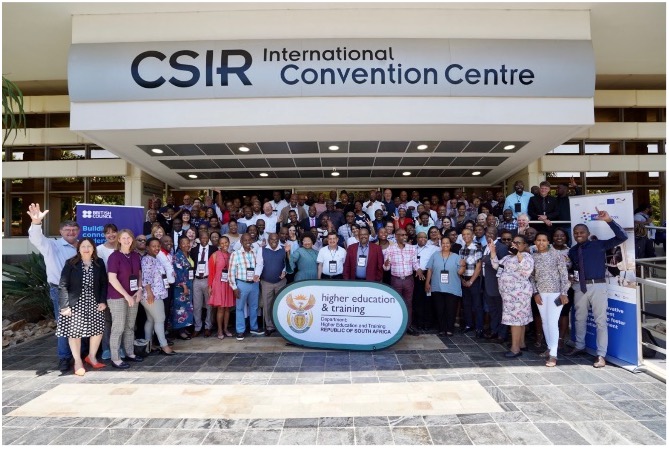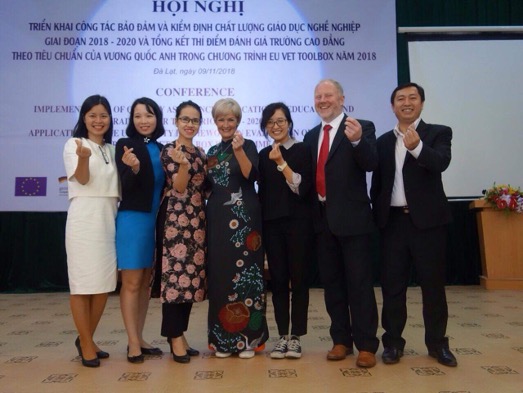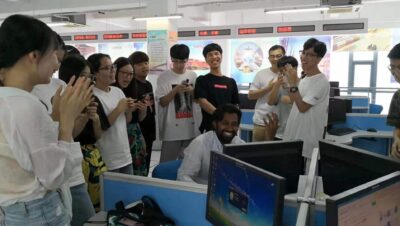
Hangzhou, China: City of Glasgow College create supply chain value
Hangzhou, China: The City of Glasgow College (COGC) partnered with Zhejiang Technical Institute of Economics (ZJTIE) in Hangzhou, China to deliver a joint Certificate in Supply Chain Logistics.
Its aim was to bring change in curriculum design that encourages student engagement in the classroom. The inclusion of various classroom activities – not limited to classroom group presentation – increased the confidence of the learners. Other activities some of which were new to the classroom included – role plays, virtual classroom organisations, supply chain games, and an instant online quiz. This initiative has also helped in improving staff/student interaction and teaching learning in English.
China’s vocational education system focuses predominantly on classroom blackboard exercises and summative assessment.
This new initiative encourages both young learners to participate in day-to- day classroom tasks, and develops skills for the job market. Simulating a work environment in class helps broaden learners’ knowledge in the subject matter and stimulates career aspirations.
Every year a team of four lecturers visit ZJTIE in China and spend three weeks in February, June and September for the delivery of face-to-face teaching. This enhances the cultural exchange and provides students with a learning journey that Scottish students experience in Scotland.
The City of Glasgow College’s team apply City Learning 4.0 in day to day activities which enables the students to enhance not just their knowledge in the subject areas, but also to understand the dynamics of the current job market from the perspective of the area experts.
The City of Glasgow College is a real melting pot of diversity, equality and excellence.
Its innovative approaches to teaching and learning enable personalised development for all our students – and its college is designed for 40,000 of them – across a range of nearly 2,000 courses from Access Level to Masters.
To date COGC have delivered 420 modern apprenticeships; 3162 work experience placements; 3467 work-based learning projects and its works directly with 1500 industry partners.
So, whether it’s full-time, part-time or distance learning, the City of Glasgow College can help you develop the skills needed to secure long term employment.
Similar to other projects and businesses, 2020 was extremely challenging for the delivery of this project. The global spread of COVID-19 and its associated travel restrictions threatened the project delivery, in particular, the face-to-face aspect of it. Face-to-face delivery mode is pivotal in the delivery of this project considering that Chinese students who enrolled for this programme do not have English as their first language.
Alternative delivery modes where considered to keep the project alive. The termination of the project or postponement of delivery for a year would have created disruptions in the completion of course.
Although travel restrictions created a challenge in the successful running of the delivery, an opportunity to continue the delivery remotely was considered. The delivery team had to overcome several other challenges.
Convincing the team that this approach works: historically, the vocational education systems in China is focussed on blackboard exercises and face-to-face deliveries. This initiative was taking students and staff out of their traditional teaching model.
Delivering in unsocial hours: the delivery team in Glasgow had to deliver the programme, as early as 3.30 am due to differences in time zones between China and Scotland.
Group work issues: group work discussions were predominantly dominated by one or two vocal students. Remote delivery and participation in class room group activities were new to the students.
Cultural Barriers: Chinese students generally do not interact in the classroom or engage in inquisitive conversations with their teachers. Remote delivery created an additional hurdle for the delivery team to overcome.
Technical Barriers: some case studies and videos are produced by the lecturers from Glasgow were not completely accessible in China. Furthermore, wider research opportunities were occasionally constrained. The WiFi connectivity were intermittent as some of the students were dialling in from halls of Residence or mobile phones.
An alternative mode of delivery was considered to deliver the programme. The team decided to use Zoom to deliver the programme remotely from Glasgow. Some of the solutions that our organisation provided to tackle the challenges mentioned above were:
Convincing the team that this approach works: The delivery team and the project lead arranged a series of meetings with the partner organisation to openly discuss the plan of action. Open discussions and brainstorming sessions helped the project lead to convince the partner organisation about this mode of delivery and its potential benefits.
Delivering in unsocial hours: By scheduling the delivery with regular breaks and providing a stable timetable we were able to get into the routine easily. The delivery team were given full freedom to customise the delivery according to their comfort, which further helped in improving the morale of the team. A WhatsApp group was created and used by the delivery team to share any information regarding technical issues, and this helped the delivery team to troubleshoot any issues they come across in their respective classes.
Group work issues: Students were initially uncertain about this type of delivery, since they were predominantly used to face-to-face teaching of English subjects. There was a lot of hesitation at the beginning and this was evident in issues that presented during group work exercises. Several icebreaker sessions were conducted along with subject discussions to stimulate student focus and group discussion. Breakout rooms in Zoom were widely used for the group works and to share their works.
Cultural Barriers: During the initial stages of the delivery, teaching assistants were used in the classroom for student support. All teaching assistants were given access to class materials and schedules at least two weeks prior the start of the delivery. Some of these teaching assistants had visited Glasgow in the previous years for teacher training programmes. Some students expressed that the teaching assistants helped them in understanding the complex topics that were being taught in English by translating this into Chinese. Furthermore, the delivery team introduced regular quizzes and rapid fire rounds during daily classes to tackle reticence and foster inclusive discussions.
Technical Barriers: Our organisation provided VLE access to all the students registered to the course. This helped students to gain access to teaching materials on a 24/7 basis. Relevant subject videos and PDFs were embedded to VLE through H5P format to avoid any issues in downloading.
Across the globe, teaching and learning practices are undergoing various challenges during the pandemic. One of the misconceptions that teachers encounter most commonly is that of entertaining their learners in the classroom. While all teachers agree that there is an element of entertainment required to encourage student engagement, lack of planning, resources and support restricts them in doing so. In particular, during the pandemic the pressure of working from home is further exacerbated with the need to have a balance between work and personal life. This also affects the mental wellbeing and efficiency of the teachers and students.
A wider collaborative approach should be taken by educational institutions to tackle the issue of student engagement in the classroom. Teachers should be encouraged to apply various innovative teaching techniques throughout classroom sessions and be allowed to improvise as required to address individual learner needs. Initiatives such as COGC- ZJTIE joint Certificate which involve amendments to the curriculum, openness in adaption of new measures, flexibility and a revision of the method of assessment, enhances the teaching and learning practice and helps in increasing the interest of young learners in the subject. A mixed approach involving digital learning and teamwork learning will attract more digital and distant learners to the classroom. Student engagement activities should also include essential requirements of the current job market, as this would help shape and support the aspiration of the learners.
Students who lacked confidence in public speaking or classroom interactions demonstrated an interest in engaging in further activities. This was evidenced through a change in the classroom dynamic with an increased sense of togetherness among the students and displaying a competitive mind-set in the completion of activities/exercises. This initiative also helped to build interpersonal skills in the student which is an essential requirement for modern supply chain management. Furthermore, some students demonstrated leadership potential by taking a lead on the given tasks and delegating these tasks to the team.
Given the ever increasing use of information and communication devices (e.g. mobile phones) in China, this initiative has helped the students to interact with one another which crucially built their communication skills. This initiative also helped teachers in contextualising the complex theoretical information into simple logical terms. Considering the long-term impact of COVID-19 across the globe, remote delivery and learning will be crucial for the partnership success and maintaining long-term cross national collaborative relationships. Furthermore, the welfare and success of the current student population is vital for the economic growth, and such initiatives always create value.

